|
|
|
Sort Order |
|
|
|
Items / Page
|
|
|
|
|
|
|
| Srl | Item |
| 1 |
ID:
186187


|
|
|
|
|
| Summary/Abstract |
How do voters want their governments to respond when another country unilaterally withdraws from an international institution? We distinguish between negotiation approaches that vary in the degree to which they accommodate the withdrawing state's demands and argue that negotiation preferences are shaped by two issues. The first is voters’ exposure to the costs and benefits of accommodation. This exposure varies across issues, and we argue that citizens will generally prefer non-accommodation on zero-sum issues, but support more accommodation on cooperation issues, where non-accommodation puts existing cooperation gains at risk. Second, withdrawal negotiations create precedents, and citizens should therefore be less willing to accommodate the more they are concerned about the ripple effects of accommodation on the institution's stability. These concerns also confront citizens with two types of dilemmas depending on how favorably they view the institution themselves. To test our argument, we use survey evidence and a conjoint experiment conducted in Germany and Spain during the Brexit negotiations. We find that respondents overall are more willing to accommodate the UK on cooperation issues than on zero-sum issues, but also find evidence that Euroskeptics and Europhiles confront different issue-specific dilemmas. Our paper contributes to a better understanding of the dynamics surrounding the challenges to multilateralism that have proliferated in recent years.
|
|
|
|
|
|
|
|
|
|
|
|
|
|
|
|
| 2 |
ID:
165882
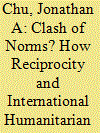

|
|
|
|
|
| Summary/Abstract |
Reciprocity is one of the oldest principles of warfare, but humanitarian norms embedded in international humanitarian law (IHL) prohibit reciprocity over various wartime acts. When it comes to the treatment of prisoners of war (POWs), how do these conflicting norms shape public opinion? One perspective is that citizens who learn about IHL acquire an unconditional aversion to abusing POWs. Alternatively, people may understand IHL as a conditional commitment that instead strengthens their approval for reciprocal conduct. Survey experiments fielded in the United States support the latter view: people’s preferences depend on the enemy’s behavior, and this “reciprocity effect” is largest among those who believe that the United States is legally committed to treating POWs humanely. Puzzlingly, prior studies do not find a reciprocity effect, but this is due to their use of a no-information experimental control group, which led to a lack of control over the subjects’ assumptions about the survey
|
|
|
|
|
|
|
|
|
|
|
|
|
|
|
|
| 3 |
ID:
165425
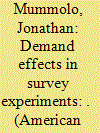

|
|
|
|
|
| Summary/Abstract |
Survey experiments are ubiquitous in social science. A frequent critique is that positive results in these studies stem from experimenter demand effects (EDEs)—bias that occurs when participants infer the purpose of an experiment and respond so as to help confirm a researcher’s hypothesis. We argue that online survey experiments have several features that make them robust to EDEs, and test for their presence in studies that involve over 12,000 participants and replicate five experimental designs touching on all empirical political science subfields. We randomly assign participants information about experimenter intent and show that providing this information does not alter the treatment effects in these experiments. Even financial incentives to respond in line with researcher expectations fail to consistently induce demand effects. Research participants exhibit a limited ability to adjust their behavior to align with researcher expectations, a finding with important implications for the design and interpretation of survey experiments.
|
|
|
|
|
|
|
|
|
|
|
|
|
|
|
|
| 4 |
ID:
186192


|
|
|
|
|
| Summary/Abstract |
How does naming and shaming affect public support for compliance with international agreements? We investigated this question by conducting survey experiments about the Paris Agreement, which relies on social pressure for enforcement. Our experiments, administered to national samples in the United States, produced three sets of findings. First, shaming by foreign countries shifted domestic public opinion in favor of compliance, increasing the political incentive to honor the Paris Agreement. Second, the effects of shaming varied with the behavior of the target. Shaming was more effective against partial compliers than against targets that took no action or honored their obligations completely. Moreover, even partial compliers managed to reduce the effects of shaming through the strategic use of counter-rhetoric. Third, identity moderated responses to shaming. Shaming by allies was not significantly more effective than shaming by non-allies, but Democrats were more receptive to shaming than Republicans. Overall, our experiments expose both the power and the limits of shaming as a strategy for enforcing the Paris Agreement. At the same time, they advance our understanding of the most significant environmental problem facing the planet.
|
|
|
|
|
|
|
|
|
|
|
|
|
|
|
|
| 5 |
ID:
178726
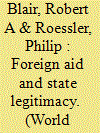

|
|
|
|
|
| Summary/Abstract |
What are the effects of foreign aid on the perceived legitimacy of recipient states? Different donors adhere to different rules, principles, and operating procedures. The authors theorize that variation in these aid regimes may generate variation in the effects of aid on state legitimacy. To test their theory, they compare aid from the United States to aid from China, its most prominent geopolitical rival. Their research design combines within-country analysis of original surveys, survey experiments, and behavioral games in Liberia with cross-country analysis of existing administrative and Afrobarometer data from six African countries. They exploit multiple proxies for state legitimacy, but focus in particular on tax compliance and morale. Contrary to expectations, the authors find little evidence to suggest that exposure to aid diminishes the legitimacy of African states. If anything, the opposite appears to be true. Their results are consistent across multiple settings, multiple levels of analysis, and multiple measurement and identification strategies, and are unlikely to be artifacts of sample selection, statistical power, or the strength or weakness of particular experimental treatments. The authors conclude that the effects of aid on state legitimacy at the microlevel are largely benign.
|
|
|
|
|
|
|
|
|
|
|
|
|
|
|
|
| 6 |
ID:
179768
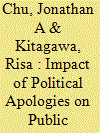

|
|
|
|
|
| Summary/Abstract |
Apology diplomacy promises to assuage historical grievances held by foreign publics, yet in practice appears to ignite domestic backlash, raising questions about its efficacy. This article develops a theory of how political apologies affect public approval of an apologizing government across domestic and foreign contexts. The authors test its implications using large-scale survey experiments in Japan and the United States. In the surveys, the authors present vignettes about World War II grievances and randomize the nature of a government apology. They find that apology-making, both as statements acknowledging wrongdoing and as expressions of remorse, boosts approval in the recipient state. But in the apologizing state, backlash is likely among individuals with strong hierarchical group dispositions—manifested as nationalism, social-dominance orientation, and conservatism—and among those who do not consider the recipient a strategically important partner. This microlevel evidence reveals how leaders face a crucial trade-off between improving support abroad and risking backlash at home, with implications for the study of diplomatic communication and transitional justice.
|
|
|
|
|
|
|
|
|
|
|
|
|
|
|
|
| 7 |
ID:
169002
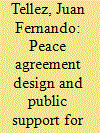

|
|
|
|
|
| Summary/Abstract |
Conflict negotiations are often met with backlash in the public sphere. A substantial literature has explored why civilians support or oppose peace agreements in general. Yet, the terms underlying peace agreements are often absent in this literature, even though (a) settlement negotiators must craft agreement provisions covering a host of issues that are complex, multidimensional, and vary across conflicts, and (b) civilian support is likely to vary depending on what peace agreements look like. As a result, we know much less about how settlement design molds overall public response, which settlement provisions are more or less controversial, or what citizens prioritize in conflict termination. In this article, I identify four key types of peace agreement provisions and derive expectations for how they might shape civilian attitudes toward conflict termination. Using novel conjoint experiments fielded during the Colombian peace process, I find evidence that citizens evaluate agreements based primarily on how provisions mete out justice to out-group combatants, and further that transitional justice provisions produced sharp divisions among urban voters in the 2016 referendum. Additional analysis suggests that material, distributive concerns were particularly salient for rural citizens. The results have implications for understanding the challenge of generating public buy-in for conflict termination and sheds light on the polarizing Colombian peace process.
|
|
|
|
|
|
|
|
|
|
|
|
|
|
|
|
| 8 |
ID:
171168


|
|
|
|
|
| Summary/Abstract |
Many theories of international relations assume that public opinion exerts a powerful effect on foreign policy in democracies. Previous research, based on observational data, has reached conflicting conclusions about this foundational assumption. We use experiments to examine two mechanisms—responsiveness and selection—through which opinion could shape decisions about the use of military force. We tested responsiveness by asking members of the Israeli parliament to consider a crisis in which we randomized information about public opinion. Parliamentarians were more willing to use military force when the public was in favor and believed that contravening public opinion would entail heavy political costs. We tested selection by asking citizens in Israel and the US to evaluate parties/candidates, which varied randomly on many dimensions. In both countries, security policy proved as electorally significant as economic and religious policy, and far more consequential than nonpolicy considerations such as gender, race, and experience. Overall, our experiments in two important democracies imply that citizens can affect policy by incentivizing incumbents and shaping who gets elected.
|
|
|
|
|
|
|
|
|
|
|
|
|
|
|
|
| 9 |
ID:
175518
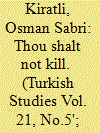

|
|
|
|
|
| Summary/Abstract |
Through an original survey experiment on a nationally representative sample of the Turkish population, this article demonstrates that respondents who are primed on the immorality of the use of force against others are substantially more willing to support only conditional military intervention in a civil war in another country. Further statistical analyses reveal that the activation of moral beliefs largely depends on the degree of approval of the moral statement and previously held foreign policy predispositions on isolationism. These findings contribute to the research on priming and public opinion regarding the use of force in general and, in particular, interventions in civil wars.
|
|
|
|
|
|
|
|
|
|
|
|
|
|
|
|
| 10 |
ID:
168999
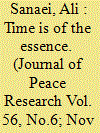

|
|
|
|
|
| Summary/Abstract |
It is often observed that public support for asymmetric wars diminishes over time, but the micro foundations of this observation are not fully understood. I present a modified war of attrition model for asymmetric wars which shows that as time passes, belligerents’ expectations for the remaining duration of war increase and they find fighting less favorable. Even when we keep the average rate of casualty accrual constant, the anticipated length of fighting into the future affects expected remaining costs of war. Therefore, in a cost-benefit calculation, observed duration causally affects expected remaining costs of war and, hence, leads to lower levels of support for war over time. The longer the war lasts, the more it will look like a never-ending war which may encourage the strong side to cut its losses short and stop the war. Because duration and aggregate costs are highly correlated in observational data, I use a randomized survey experiment to separate the effect of duration from the effect of costs on support for war. The result is that duration has a negative effect on public support which is independent of aggregate costs. This helps us better understand the limits of democratic states’ capabilities in fighting asymmetric wars and suggests that when military planners ignore the role of time, they deploy weaker-than-optimal forces.
|
|
|
|
|
|
|
|
|
|
|
|
|
|
|
|
| 11 |
ID:
171798
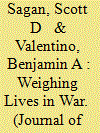

|
|
|
|
|
| Summary/Abstract |
This article explores how the American public weighs tradeoffs between foreign and compatriot fatalities during war. This focus provides an important window into the meaning and significance of citizenship and national identity and, in turn, the most fateful consequences of inclusion and exclusion in the international context. To examine these attitudes, we conducted an original survey experiment asking subjects to consider a fictional US military operation in Afghanistan. We find that: (1) Americans are significantly more willing to accept the collateral deaths of foreign civilians as compared to American civilians in operations aiming to destroy important military targets; (2) Americans are less willing to risk the lives of American soldiers to minimize collateral harm to foreign civilians as compared to American civilians; (3) Americans who express relatively more favorable views of the United States compared to other nations are more willing to accept foreign collateral deaths in US military operations; and (4) Americans are more willing to accept Afghan civilian collateral deaths than those of citizens from a neutral state, such as India. Many Americans recognize that placing a much higher value on compatriot lives over foreign lives is morally problematic, but choose to do so anyway.
|
|
|
|
|
|
|
|
|
|
|
|
|
|
|
|
| 12 |
ID:
138269
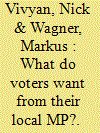

|
|
|
|
|
| Summary/Abstract |
This article summarises the findings from a study of what constituents want from their local Member of Parliament.1 We make use of a survey technique known as conjoint analysis, wherein we present a national sample of British voters with profiles of hypothetical MPs who vary randomly in their characteristics, activities and behaviour. We find that voters like MPs who are independent from the party line and who do not focus exclusively on national policy work. MPs' gender and experience matter far less to constituents. Overall, voters want a Parliament made up of strong-minded MPs who see their role as that of a constituency representative. This has important implications for parliamentary democracy in Britain.
|
|
|
|
|
|
|
|
|
|
|
|
|
|
|
|
| 13 |
ID:
190691


|
|
|
|
|
| Summary/Abstract |
Why do voters accept clientelism? Previous research suggests that poorer voters are more likely to accept clientelistic benefits. However, identities may moderate the effect of poverty through identity-based economic comparisons across groups. The role identity plays in partisanship, and dense ethnic identity networks may make it easier for parties to enforce clientelism among specific groups. This paper presents evidence from a survey experiment in Turkey to argue that politicized Kurdish ethnic identity, combined with heightened perceptions of relative economic deprivation, explains why certain voter groups are more likely to accept clientelism. Additionally, experimental evidence shows that support for clientelism may depend on the quality of benefits rather than quantity. Focusing only on the amount of resources or the recipients’ economic conditions may fail to explain why certain voters accept clientelism more in the Turkish context.
|
|
|
|
|
|
|
|
|
|
|
|
|
|
|
|
|
|
|
|
|